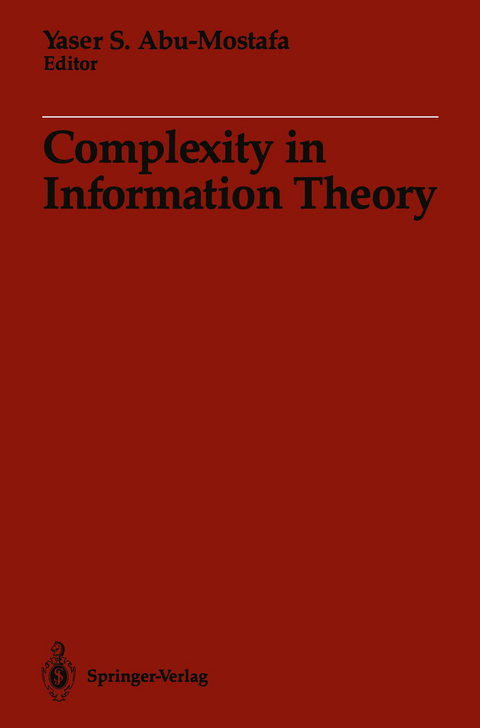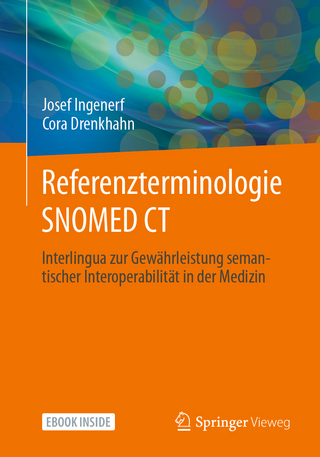
Complexity in Information Theory
Seiten
2011
|
Softcover reprint of the original 1st ed. 1988
Springer-Verlag New York Inc.
978-1-4612-8344-7 (ISBN)
Springer-Verlag New York Inc.
978-1-4612-8344-7 (ISBN)
The means and ends of information theory and computational complexity have grown significantly closer over the past decade. The basic assumption of limited computing resources is the premise for cryptography, where the distinction is made between available information and accessible information.
The means and ends of information theory and computational complexity have grown significantly closer over the past decade. Common analytic tools, such as combinatorial mathematics and information flow arguments, have been the cornerstone of VLSl complexity and cooperative computation. The basic assumption of limited computing resources is the premise for cryptography, where the distinction is made between available information and accessible information. Numerous other examples of common goals and tools between the two disciplines have shaped a new research category of 'information and complexity theory'. This volume is intended to expose to the research community some of the recent significant topics along this theme. The contributions selected here are all very basic, presently active, fairly well-established, and stimulating for substantial follow-ups. This is not an encyclopedia on the subject, it is concerned only with timely contributions of sufficient coherence and promise. The styles of the six chapters cover a wide spectrum from specific mathematical results to surveys of large areas. It is hoped that the technical content and theme of this volume will help establish this general research area. I would like to thank the authors of the chapters for contributing to this volume. I also would like to thank Ed Posner for his initiative to address this subject systematically, and Andy Fyfe and Ruth Erlanson for proofreading some of the chapters.
The means and ends of information theory and computational complexity have grown significantly closer over the past decade. Common analytic tools, such as combinatorial mathematics and information flow arguments, have been the cornerstone of VLSl complexity and cooperative computation. The basic assumption of limited computing resources is the premise for cryptography, where the distinction is made between available information and accessible information. Numerous other examples of common goals and tools between the two disciplines have shaped a new research category of 'information and complexity theory'. This volume is intended to expose to the research community some of the recent significant topics along this theme. The contributions selected here are all very basic, presently active, fairly well-established, and stimulating for substantial follow-ups. This is not an encyclopedia on the subject, it is concerned only with timely contributions of sufficient coherence and promise. The styles of the six chapters cover a wide spectrum from specific mathematical results to surveys of large areas. It is hoped that the technical content and theme of this volume will help establish this general research area. I would like to thank the authors of the chapters for contributing to this volume. I also would like to thank Ed Posner for his initiative to address this subject systematically, and Andy Fyfe and Ruth Erlanson for proofreading some of the chapters.
I Computational Information Theory.- II Communication Complexity.- III Introduction to Information-Based Complexity.- IV Complete Representations for Learning from Examples.- V Collective Computation, Content-Addressable Memory, and Optimization Problems.- VI Complexity of Random Problems.
| Zusatzinfo | XI, 131 p. |
|---|---|
| Verlagsort | New York, NY |
| Sprache | englisch |
| Maße | 155 x 235 mm |
| Themenwelt | Informatik ► Theorie / Studium ► Algorithmen |
| Informatik ► Theorie / Studium ► Kryptologie | |
| Informatik ► Theorie / Studium ► Künstliche Intelligenz / Robotik | |
| Mathematik / Informatik ► Mathematik ► Algebra | |
| Mathematik / Informatik ► Mathematik ► Angewandte Mathematik | |
| Mathematik / Informatik ► Mathematik ► Wahrscheinlichkeit / Kombinatorik | |
| ISBN-10 | 1-4612-8344-2 / 1461283442 |
| ISBN-13 | 978-1-4612-8344-7 / 9781461283447 |
| Zustand | Neuware |
| Haben Sie eine Frage zum Produkt? |
Mehr entdecken
aus dem Bereich
aus dem Bereich
IT zum Anfassen für alle von 9 bis 99 – vom Navi bis Social Media
Buch | Softcover (2021)
Springer (Verlag)
29,99 €
Interlingua zur Gewährleistung semantischer Interoperabilität in der …
Buch | Softcover (2023)
Springer Fachmedien (Verlag)
32,99 €
Eine Einführung mit Java
Buch | Hardcover (2020)
dpunkt (Verlag)
44,90 €


